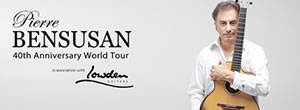Catch Pierre Bensusan At The Half Moon On His 40th Anniversay World Tour
"The way the guitar would want to sound if it played itself"
If “World Music” is music that pays tribute to the spirit of a collection of human beings through distinct rhythms, traditional instruments and harmonic colors, French-Algerian guitarist, singer and composer Pierre Bensusan can be recognized as one of the most eloquent and diverse world musicians of our time.

Born in Oran, French-Algeria, in 1957, when France was decolonizing its Empire, Pierre Bensusan's family moved to Paris when he was 4. He began formal studies on piano at the age of 7 and at 11 taught himself guitar. Influenced in those early days by the folk revival blooming in Britain, France and North America, Bensusan began first to explore his own diverse musical heritage and then moved to the horizons beyond.
At 17 he signed his first recording contract, and one year later his first album Pres de Paris won the Grand Prix du Disque upon his debut at the Montreux Festival in Switzerland.
Described by the L.A. Times as "one of the most unique and brilliant acoustic guitar veterans in the world music scene today", Pierre Bensusan was voted "Best World Music Guitar Player in 2008" by Guitar Player Magazine Readers Choice. His name became synonymous with contemporary acoustic guitar genius, long before the terms New Age, New Acoustic Music or World Music were invented. He has the ability to make a single guitar sound like an entire band as he brings the audience on a mesmerizing musical journey. And yet, Bensusan is more than what any musician or music lover expects from a guitarist. He is a composer as well as a bilingual and a brave improvisational vocalist, melding whistles and resonant low notes with something like his own scat technique.
There is a sense of something both playful and serious in his work, an unparalleled sense of freedom in his compositions and his improvisations. His "manner" of playing defies classification - crossing world, classical, jazz, traditional, folk and more. None can be isolated as simply “Brazilian”, "Arabic" or “French”; rather, they represent our world in its current state, a world sharing itself, fusing cultures together in ways we have never experienced. Not to be missed!
June 5, 2014